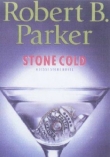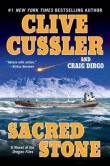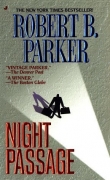
Текст книги "Foreign Affairs"
Автор книги: Stuart Woods
сообщить о нарушении
Текущая страница: 10 (всего у книги 14 страниц)
41
A squad of Italian police arrived bright and early at a freight yard connected to Leo Casselli. The commanding officer marched into the office and found two people working there. He handed them a search warrant. “I want the registration and insurance documentation for every vehicle and trailer on this lot,” he said to the man in charge, “and be quick about it.”
“Do you know who owns this place?” the manager whispered to him.
“Yes, I do,” the cop whispered back. “It’s Leo Casselli’s place.”
The man blanched. “I will get into big trouble.”
“You’re already in big trouble,” the cop said. “And if I have to tell you again to get moving, I’ll put you in handcuffs and tear this place apart.”
The man got moving. He went to a filing cabinet and removed a stack of folders. “Here,” he said. “This is the file on every piece of equipment in the yard. The serial number for each is written on the outside of the folder.”
The cops went to work. Two hours later, the lead cop called his men together. “Have you finished?”
“Yes, sir,” one of them said. “Except for that trailer, the refrigerated one—there is no record of it.”
“Get me the bolt cutters,” he said.
He walked over to the trailer and cut the padlock. “Open it!”
Two men swung open the doors; the trailer was filled to the ceiling with cardboard boxes.
“What is it?” the cop asked.
A man pulled down a box and cut it open. “Candy,” he said.
“Bring me those two people from the office.”
The two workers were marched out.
“Where is the paperwork for this trailer?”
“Um, there is no paperwork,” one of them said. “We arrived for work a couple of days ago, and it was sitting here. We have to refill the tank for the refrigeration unit every day.”
“You are both under arrest for the receiving of stolen goods,” the cop said, “and every vehicle and trailer on this lot is now confiscated. Bring me the keys for all of them.”
“Confiscated?” the man said. “I will be shot.”
“It is now all the property of the Italian government,” the cop said, “and so are you.”
–
Stone, Dino, and Viv were at lunch, with Jim and Dante as their guests, when Dante’s phone rang. “Pronto.” He listened for a moment. “Eccellente.” He hung up. “You will all be delighted to know that we have found the missing shipment of chocolate, and that the trailer is parked on a lot owned by Leo Casselli. We have confiscated half a dozen trucks and two dozen trailers and arrested the workers there. It will be interesting to see who makes bail for them.”
“Baron Klaucke will be thrilled,” Stone said, “but only if this leads to Casselli’s arrest and conviction.”
“Now we have two provable charges against Casselli,” Dante said. “The kidnapping of the baron and the larceny of the chocolate and its trailer. That’s progress.”
–
Casselli was having a light lunch when his phone rang. “Pronto.”
“Don Leonardo,” a voice said, “the police have raided your lot in Naples and have discovered the load of chocolate.”
Casselli laughed. “They are welcome to it,” he said.
“It is worse,” the voice said. “They have arrested your two employees on the lot and they have confiscated every vehicle there.”
“Confiscated?” Casselli asked, disbelieving. “Call our captain of police in Naples and have this order canceled at once.”
“I have already called him,” the man said, “and he hung up on me.”
“Hung up on you? I don’t believe it!”
“He must believe his telephone is tapped.”
“What phone are you calling from?”
“My cell phone, Don Leonardo.”
“Bail those people out of jail before they start talking!” He hung up.
“Something wrong, darling?” the lovely Sophia asked.
“You might say that,” Casselli said, and he was sweating.
–
Casselli isn’t going to like this,” Lugano said, smiling.
“Wait until he tries to get his people out of jail,” Dante said. “We have moved them south, to Salerno. He is not going to like that a lot!”
“It’s about time he started to get nervous,” Jim said. “He’s not accustomed to being nervous, and when people are nervous, they make mistakes.”
42
Leo Casselli got back into his truck and was driven to Naples, to a prearranged meeting site. His two top capos, newly appointed to fill the places of their departed predecessors, stood before him, looking anguished.
“What is going on here?” Casselli demanded.
“We don’t know, Don Leonardo,” the braver of the two replied. “Our vehicles are being stopped and ticketed for speeding and broken taillights, even when they were not speeding and their taillights were not broken. Three restaurants have been inspected and closed by the health authorities. Four building sites have been shut down for safety violations. We have security camera footage of four men who entered another site with guns drawn, and all the vehicles at the trucking yard have been confiscated and taken away and two employees arrested. We cannot bail them out, because we can’t find them.”
“Wait a minute. You said security camera footage?”
“Yes, Don Leonardo. Would you like to see it?”
“Immediately.”
The man took a cassette from his briefcase and inserted it into a player, then pressed a button.
Casselli watched intently as the four men entered the top floor of the building and moved around two stacks of building materials. Then they moved toward the radio and came into the light. “Stop it right there!” Casselli said. “Rewind a few seconds. Stop!” He peered at the images. “Do you know these men?”
“Two of them are agents of the DIA, the ones on either end. We don’t know the other two.”
“I know one of them!” Casselli spat. “His name is Barrington, and he is the partner of Marcel duBois! I want him found and brought to me immediately!”
“Ah, so that is Barrington,” the man said. “We know where he is.”
“Where?”
“At the building belonging to Marcel duBois. It is surrounded by the police and the DIA, and there are vehicles there registered to the American Embassy.”
“Then bring him to me!”
“Don Leonardo, I am sorry to say that the security in the building and its courtyard has been impenetrable for us, and they have discovered and disconnected our cameras and listening devices in the building. On the one occasion that Barrington and his friend left the building and drove to Tivoli, they did so in an embassy vehicle that had bulletproof glass and bodywork, and our attempt to kidnap them failed.”
“So now I have to deal not only with the police and the DIA, but the health department, building inspectors, and the Americans?”
“It would appear so, Don Leonardo. I regret that, in the present circumstances, we are unable to carry out your orders.”
Casselli glared at the man and waited for him to wilt, but he did not. He began to admire his courage, and, being a practical man, he recognized that what he was being told was true. “Still,” he said, “we have an edge.”
“We do, Don Leonardo? What is that?”
“Give me a secure cell phone,” Casselli said.
The man removed a phone from his pocket and handed it to him.
Casselli looked closely at it. “This cannot be traced?”
“We change them every day,” the man said. “That one has not yet been used.”
Casselli took a notebook from his pocket and found a number, then dialed it.
–
Stone was alone in the living room when his phone rang. He checked caller ID and saw nothing. “Hello?”
“Good day, Mr. Barrington,” Casselli said. “Do you know who this is?”
Of course he knew, but he wanted Casselli to say it. “No. Who are you?”
“This is Leonardo Casselli.”
“Oh, yes, I remember you. I last saw you running from a Paris restaurant, ahead of the police.”
“Very far ahead. It was duplicitous of you to try to take me, and worse, ineffective.”
“What can I do for you, Leo?” He knew Casselli hated being called that.
“How would you like to buy back the girl?”
“I would have to speak to her, before I can even discuss that,” Stone said. “I will need proof of life. Surely you have kidnapped people before—you know how these things are done.”
“I can arrange for you to hear her scream,” Casselli said through clenched teeth.
“Come now, Leo, making threats will not get us to a mutually satisfying conclusion. What do you want?”
“Fifty million euros,” Casselli said, “and the attention of the police withdrawn.”
Stone laughed aloud and hung up the phone. He called Lugano.
“Yes?”
“Casselli just called. Did you get a trace on him?”
“On which phone?”
“The old one.”
“No. Our system can only do two searches at a time. Capacity is taken up by a watch on your new cell and Hedy’s phone.”
“Shit. Hedy’s phone is dead. Take it down and concentrate on my two phones.”
“All right. What did Casselli have to say?”
“He’s feeling the heat,” Stone said. “He wanted fifty million euros and, get this, the police and the DIA off his back.”
“Jesus, is he serious about the money?”
“Of course not, he’s just trying to show me he has the upper hand. He wouldn’t let me speak to Hedy. That indicates to me that he and she are not in the same place. He threatened to torture her.”
“What did you say to him?”
“I hung up the phone.”
“Well, that was gutsy of you.”
“What else could I do? I’m not going to give him fifty million euros, even if I could raise it.”
“Well then, I suppose the next move is his. Let’s see what he comes up with.”
“Right.” Stone hung up, hoping that Casselli’s next move was not Hedy screaming into the phone.
43
Casselli sat, fuming. The insolence of this Barrington! He was unaccustomed to being spoken to in that manner, and no one, but no one, ever got away with hanging up on him during a telephone conversation. He turned to the two men. “I have a rather distasteful job for you,” he said.
“Anything, Don Leonardo,” they said in unison.
“I need you to go and take the finger of a young woman.” He explained exactly how he wanted it done.
“Which finger, Don Leonardo?” one of them asked.
“Oh, let’s see, how about right index?”
“It shall be done, Don Leonardo.”
–
Stone and Dino were having a drink with Viv and Marcel at the end of the day, when a package was delivered.
“Who is this from?” Stone asked.
“We don’t know, but it’s not explosive. It’s an object about three inches long,” the DIA agent said. “Would you like me to open it?”
“Please,” Stone said.
The young man produced a switchblade, flicked it open, and cut the tape around the box. He removed the lid and handed it to Stone.
Whatever it was was in an envelope of suede leather, like something from a jewelry store. Stone opened it and shook out the contents into the box. He blanched. The object was a human finger, with a brightly painted nail. “Jesus Christ.”
Jim Lugano came into the room. “I heard there was a package delivered,” he said. “Was it checked out?”
Stone handed him the box. “I checked it out, and I’m sorry I did.”
“Well,” Lugano said, looking at the thing, “that’s gory. Do you recognize it as being Hedy’s?”
“I’ve no idea. I never examined her fingers.”
Jim pointed at the young Italian agent. “You. Come with me.” The two men left the room. Twenty minutes later, Jim returned. “I’ve sent it to the police lab. Do you know if Hedy has ever been fingerprinted?”
Stone shook his head.
“Military service? Arrest? Application for a gun license? Anything?”
“I don’t know,” Stone said. “Run the print and see what you come up with.”
“That’s being done,” Jim said. “I’m going to go over to the lab and see what they’re finding out. Do you want to come?”
“No, thanks,” Stone said. “Right now I’m working on not losing my lunch.”
“I’ll call you when I know something.”
“Try for some more cheerful news,” Stone said. Jim left, and the others sat there, silent. “Maybe I shouldn’t have hung up on Casselli,” Stone said at last.
“Stone, this is not your fault,” Viv said.
“Isn’t it? The worst luck Hedy has ever had was meeting me on an airplane. This wouldn’t have happened to her otherwise.”
They sat, mostly in silence, for another hour or so; then Stone’s phone rang, and he got it out of his pocket.
“Just a moment,” Viv said. She took a small object from her pocket and affixed it to the back of his phone. “Now answer it.”
Stone pressed the button. “Hello?”
“You don’t sound so good,” Casselli said. “Has something upset you?”
Stone was silent.
“It was very quick, you understand, and a nurse was standing by, so no permanent damage has been done.” He paused for a beat. “Yet.”
Stone still couldn’t speak.
“Of course, it was very painful—nothing to be done about that.”
“You miserable piece of shit,” Stone was finally able to say. “I hope I find you before the police do.”
“That would be a very interesting meeting,” Casselli replied. “Now, are you ready to negotiate the release of the girl?”
“I won’t negotiate with you.”
“I don’t know what it takes to move you, Mr. Barrington. Shall I send you more body parts? Would you like to return them to her parents?”
Stone hung up. Viv took the phone from him, tapped some keys, and replayed the conversation. Everyone listened, rapt. “Good man,” Viv said when it was done.
Jim Lugano strode into the room. “Relax,” he said, “the finger doesn’t belong to Hedy.”
“How do you know?” Stone asked.
“We found her prints from an application she made for a Global Entry pass, the thing that gets you through airport security in a hurry. No match. Also, the lab says the finger, though recently severed, had been refrigerated for several days. The finger was probably taken at a morgue. Finally, we got a hit on the print from the Italian database: the woman it belonged to had an arrest record for prostitution in Naples.”
Stone heaved a loud sigh. “When you find Casselli, I hope you’ll give me a few minutes alone with him.”
44
Casselli paced back and forth across his new living room. He had been faced with uncooperative victims before, but never one like Barrington. Normally, he could beat, shoot, or bomb a holdout into submission, but Barrington, in addition to being a hardhead, had the connections to make himself unavailable for mayhem or murder.
Finally, Casselli turned to a minion. “Bring the girl to me,” he said.
Moments later, Hedy was marched into the living room. “Ah, Miss Kiesler,” Casselli said. “I won’t detain you long.” He held up a finger, then pressed the redial button on his phone.
–
Stone answered the call on speaker, so everyone in the room could hear the conversation. “Yes?”
“You said you wished to speak to the girl,” Casselli said.
Before Stone could reply, he heard Hedy’s voice, shouting, “Wow, what a view! I can see almost as far as Capri!”
There were sounds of a scuffle.
“Did you hear that?” Casselli asked.
“Hear what?”
“The voice of your lover.”
“All I hear is you.”
“You still wish to speak with her?”
“Certainly.”
Hedy came on. “Don’t do what he wants, Stone!” she shouted. “If he hurts me, Arthur will destroy him!”
There were more sounds of struggle, then Casselli came back on. “There, did you hear that?”
“Yes, and I will follow her instructions to the letter,” Stone said. “You don’t know what you’ve gotten yourself into, Leo. She’s right about Arthur—he will destroy you.” Stone hung up.
“Who the hell is Arthur?” someone asked.
“Hedy’s stepfather, Arthur Steele.”
“Who is he?”
“He’s an insurance executive.”
“Does he have the means to destroy Casselli?”
“No, but Casselli doesn’t know that.”
Everyone burst out laughing.
–
Kill her!” Casselli screamed at his men. “Cut her into pieces, and send them to Barrington!”
“Yes, Don Leonardo,” one of them said, and the men began to drag her from the room.
“Wait a minute!” Hedy yelled.
Astonished, they stopped.
“What?” Casselli shouted.
“I want a priest.”
“Are you insane?” Casselli asked.
“I’m a good Catholic, I want to make my confession and have the last rites of the Church!”
“I’m not going to get you a priest!”
“Are you a Catholic?”
“Of course!”
“Then you can’t deny me a priest!” Hedy was not a Catholic, and she had no idea whether this was correct. “You will go directly to hell, no purgatory!”
Casselli stopped talking; his jaw worked, but no sound came out.
“And if you murder me, I will prepare the way for you to hell’s gates!” She groped for something else to say. “And Arthur is a friend of the Pope! He will ask him to excommunicate you immediately!” This was a bald-faced lie; Arthur was Jewish, and he had no acquaintances in the Vatican that she knew of.
“You are worse than this Barrington!” Casselli shouted. He waved a hand. “Take her back to her room!”
“Do you still want us to kill her, Don Leonardo?” one of the men asked.
“No. Not yet! When I say!”
The men dragged Hedy away. “You don’t know who you’re dealing with!” she shouted back at him.
Casselli sank into a chair and mopped his brow. Perhaps she was right; maybe he didn’t know who he was dealing with.
First, this Barrington, now this Arthur, who was a friend of the Pope! Casselli didn’t even know the Pope! He wasn’t much of a Catholic, but he feared the Church. If he killed this girl, she would precede him into the next world, and the Church’s wrath would be waiting for him.
–
She’s confirmed her location,” Stone said. “She said she could almost see Capri.”
“Dante,” Jim Lugano said, “do we have enough on Casselli to raid this house on the cliff?”
“Having enough is not the problem,” Dante replied. “It would require nothing less than a full-scale military assault to take the place, and the girl could die in the middle of that. We would be moving out of the world of criminal justice and into the world of politics, where anything could happen. Who knows who Casselli has bought?”
“We’re just going to have to find another way,” Stone said.
45
Hedy was returned to her little room and locked in. But in the past minutes—the first time she had been let out of her prison—she had learned a few things. They were on the Amalfi Coast, she had been right about that. Now she had to start finding a way out of this room and then out of the house.
She found a wire coat hanger in her closet and began trying to shape part of it into a lock pick. She didn’t know much about picking locks, but this one was large and old-fashioned and used a large key. She worked on it until dinner came, and at the scraping of the key in the lock she jumped back onto the bed.
Lasagna this time; she ate it greedily, pouring the wine down the toilet, as usual. Maybe picking the lock had not been such a good idea. The woman who brought the food was a little smaller than she; maybe she could be overcome. She knew where the key was—in her apron pocket. She looked around for a weapon, should she need it. Nothing, only a rickety caned chair, very old. Nothing to tie the woman up with, either, and she would have to be gagged, too, and there was nothing for that, unless she started tearing up the sheets. She tried it, but without a cutting tool, she couldn’t make it work.
She thought of bribing the woman, but she didn’t have any money to show her, and she was unlikely to accept a promise of funds later. She would also be afraid of her employer.
Hedy went back to working on the coat hanger.
–
A couple of hours later, she began experimenting with the pick she had made. She had bent one end to a right angle by clamping it in a drawer and bending the long end. Then she made another, larger right angle at the other end to use as turning leverage. The whole thing was, maybe, four inches long. She was surprised once, when she heard the key scrape in the lock and barely had time to duck into the bathroom and flush the toilet before the woman came in and took her tray. When Hedy came out she was alone again and went back to work on the key. Finally, she got it placed inside the lock and thought she had found a sweet spot. Using both hands, she turned the other, larger end and felt something inside move. A moment later the door was unlocked.
She cracked it open and listened. There was conversation in Italian from the kitchen between two women, who from the sound of their activity were cleaning up. She closed the door softly. She would wait until later, when the house was asleep.
–
It was well past midnight, she thought, when she opened the door and listened again. No voices, no pots clattering, just silence. She was in a hallway, and there were other doors like her own, numbered. She was in three. The household workers must be asleep in one, two, and four. No light shined from under the doors. She took off her shoes and, holding them in one hand, moved slowly and silently down the hall, emerging into a kitchen, large and commercial-looking. There she found a door that seemed to lead farther to the rear of the house. On her way she spotted a waiter’s corkscrew and stuffed it into her jeans pocket with the lock pick; she wasn’t sure why, but it had a blade that might come in handy. It occurred to her later that she could have found a proper knife in the kitchen.
She opened the door, which led into another hallway and several storage rooms. She could see another door at the end, and she made her way to it. Locked. The top half was of glass panes, and she could see trees moving in the darkness and hear the wind blowing. She inspected the lock with her fingers. There was no thumbscrew; it must be locked with a key.
She felt the ledge above the door: nothing. She ran her fingers along the inside wall, and found it: a teacup hook, with a key dangling from it. She felt her way back to the lock, slipped the key into it, and turned. It opened. She removed the key and let herself out, locking it behind her. It would stop anyone chasing her, until they could find another key.
She leaned against the door for a moment to let her heart slow its beating and her eyes become accustomed to the darkness. She fought the exhilaration that came with being free; she still had to be careful. She stood on the edge of a broad deck and saw an opening in the handrail ahead. She crossed the expanse quickly and stopped at the opening. There was a path, and it led upward.
Then she heard a terrible sound: someone was trying to open the door behind her, and in a moment they would know the key was gone. Rain began to fall. She moved ahead quickly, feeling her way. The path began to narrow as she climbed. Then the clouds broke for a moment, long enough to let some moonlight through. She saw that the right side of the path was a sheer drop into a void, and there was only a rope handrail between her and that void.
The moon vanished again, leaving her in pitch darkness, with only her memory of the scene to guide her.
She plunged ahead into the black night, doing her best to stay to her left. Then she fell, stretching her arms out, trying to catch the rope. Instead, she caught a blow to the head.








